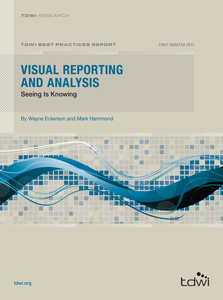
TDWI Best Practices Report | Visual Reporting and Analysis: Seeing Is Knowing
January 3, 2011
Data visualization is increasingly an essential element of business intelligence (BI). No longer restricted to specialized applications, data visualization in the form of charts, maps, and other graphical representations is enabling business users to better understand data and use it to achieve tactical and strategic objectives. Moreover, data visualization is prompting a cultural shift toward more analytic, data-driven business and operations by empowering users to explore, in a graphically inviting medium, data that was previously available only in tabular reports.
This TDWI Best Practices Report, which is based on a Web survey of BI professionals and interviews with BI practitioners and experts, finds that data visualization is in the middle of a remarkable growth phase. It also reveals that data visualization contributes impressively to improvements in business user insight and productivity, as well as usage of dashboards (the preferred medium for data visualization). For instance, 74% of our survey respondents credit data visualization for a “very high” or “high” increase in business user insights.
But data visualization is never a plug-and-play solution, and one size does not fit all. Dashboard design and usage can and should vary by types of users (for example, executives versus front-line staff), purpose (strategic, tactical, operational), and industry and organizational culture (a healthcare organization versus a clothing manufacturer). Customization collaboration, and iteration are required for organizations to operate interactive visual reporting and analysis solutions that deliver maximum benefits.